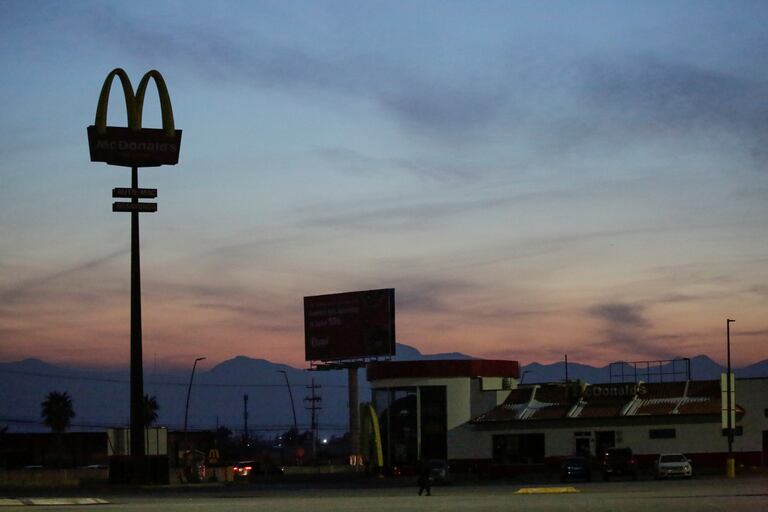An industrial area of Ciudad Juárez, during the blackout of February 15.JOSE LUIS GONZALEZ / Reuters
If money makes the world go round, as the song goes, natural gas is not far behind as far as the Mexican economy is concerned.
The supply crisis that has affected the country for five days, aggravated by the Texas ban on hydrocarbon exports, has turned the Mexican electricity system upside down and forced hundreds of factories to stop machines or reduce their production.
The industry has suffered multi-million dollar losses during the week and warns of greater damage if supplies are not restored soon.
It is the second major blow in less than a year, after the closure by the covid-19, and threatens to interrupt the reactivation.
Industry in the north of the country had not experienced a similar event for a decade, when a blackout in Baja California was resolved in a matter of hours.
This time it's been five days with problems.
The intense cold that hits the southeastern United States has frozen the instruments to extract gas and has triggered prices.
Across the border, this translated into a massive power outage on Monday that affected 4.7 million people.
Although service has already been restored, Texas' decision to close the door to exports, with which Mexico covers 70% of the gas it uses to generate electricity, has again tightened the screws.
The Ministry of Economy said this Friday that it expects exports "to resume normally to avoid further damage to industries."
Maquilas estimated $ 4.725 million in losses as of Wednesday due to power outages.
Of the 2,600 factories that make up the National Council of the Maquiladora Industry (Index), about 700 were still idle.
"They raise the doubt about whether the supply will be continuous and they gave their employees vacations," says Luis Manuel Hernández, president of Index.
Those that have started have not done it at full capacity.
There are industries that don't even have that option.
The steel mill or glass factories, for example, use natural gas not only as a source of electricity but also as a fuel in their production processes.
The automotive sector, source of 13% of manufacturing GDP, has been another of the hardest hit.
The authorities have asked the shipowners to reduce electricity consumption due to the persistent instability in the system.
At least five plants have decided to stop machines or reduce their operation until Monday, at which point Texas is supposed to lift the ban on exports.
BMW has "temporarily reprogrammed" some processes, while Volkswagen has completely halted the production line of three vehicle models this Thursday and Friday.
In a letter to President Andrés Manuel López Obrador, the automotive associations expressed their “great concern” about the “uncertainty” in the energy supply.
When they start up again, factories will have to make up for lost time.
“Before, it was operating at a 65% capacity.
Probably some assemblers will take advantage of that additional 35% to accelerate the recovery ”, points out José Guillermo Zozaya, president of the Association of the Automotive Industry (Amia), although he points out:“ No matter how much you accelerate it, there is a cap on capacity ”.
As for the maquiladoras, it will take four days for them to recover production levels, according to Index, and to achieve this will cost money: 94 million dollars a day just in double-shift wages in the four most affected northern states.
Recovering production does not erase lost days.
The Mexican maquiladoras are one more link in a global production chain.
If the link fails, the chain wobbles.
“We are vulnerable.
If the factory doesn't deliver, someone else is willing to deliver.
Customers are going to find out how to fulfill the order ”, explains Luis Manuel Hernández.
The sector employs more than 2.7 million people and its exports left 255,000 million dollars in 2020.
Amid the biggest economic crisis since the 1930s, the gas shortage is another stumbling block on the road to recovery.
To contain the pandemic, the Mexican government decreed in April the closure of all non-essential activities, including much of the industry.
And, although the reopening began in mid-May, its effect has been slow due to depressed foreign demand.
In 2020, the automotive sector, highly dependent on exports, saw a 21% drop in shipments abroad compared to the previous year and the maquila sector, a 7% drop.
The economist José Luis de la Cruz, director of the Institute for Industrial Development (Idic) predicts that the impact of the gas crisis will cost close to one point of GDP in February and that activity will not normalize until the end of the month or the beginning of March, even when Texas turns on the tap.
"It is not just that gas is released, but that it is released at prices that are profitable and these will take between two and five days to normalize depending on the damage to the infrastructure," he says.
"This cut has been a blow to the industry's waterline that is going to slow down recovery," he says.
Subscribe here
to the
newsletter
of EL PAÍS México and receive all the informative keys of the current situation of this country

